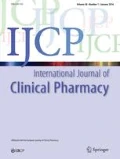Abstract
It is well known that patient adherence to appropriately prescribed medications is essential for treatment efficacy and positive therapeutic outcomes. It is also understood that patients who are prescribed medications do not necessarily take them as prescribed. Indeed, variation in patients' medication-taking is an age old conundrum which remains the focus of much interest amongst researchers and clinicians owing to its far-reaching consequences. Despite the extensive adherence-related research over the last four decades and a recent surge in this field, there remains a lack of uniformity in the terminology used to describe adherence and its related concepts. In turn, it is often difficult to conduct comparisons between adherence-related studies, which may be associated with the non-cumulative nature of work in this field. The purpose of this commentary is to provide an overview of key terminology relating to the field of adherence research.
References
Adams F. Genuine works of Hippocrates. Melbourne: Krieger Publishing; 1972.
World Health Organization. Adherence to long-term therapies: evidence for action. Geneva: World Health Organization; 2003.
Fredericks EM, Magee JC, Opipari-Arrigan L, Shieck V, Well A, Lopez MJ. Adherence and health-related quality of life in adolescent liver transplant recipients. Pediatr Transplant. 2008;12(3):289–99.
Drotar D, Greenley RN, Demeter CA, et al. Adherence to pharmacological treatment for juvenile bipolar disorder. J Am Acad Child Adol Psychiatry. 2007;46(7):831–9.
Buckley P. Adherence to mental health treatment. New York: Oxford University Press; 2009.
Osterberg L, Blaschke T. Adherence to medication. N Engl J Med. 2005;353(5):487–97.
Lehane E, Mccarthy G. Medication non-adherence–exploring the conceptual mire. Int J Nurs Pract. 2009;15(1):25–31.
Chacko A, Newcorn JH, Feirsen N, Uderman JZ. Improving medication adherence in chronic pediatric health conditions: a focus on ADHD in youth. Curr Pharm Des. 2010;16(22):2416–23.
Vrijens B, De Geest S, Hughes DA, et al. A new taxonomy for describing and defining adherence to medications. Brit J Clin Pharm. 2012;73(5):691–705.
Bissonnette JM. Adherence: a concept analysis. J Adv Nurs. 2008;63(6):634–43.
Blackburn DF, Swidrovich J, Lemstra M. Non-adherence in type 2 diabetes: practical considerations for interpreting the literature. Patient Prefer Adherence. 2013;7:183–9.
Sackett DL, Haynes RB. Compliance with therapeutic regimens. Baltimore: The Johns Hopkins University Press; 1976.
Hughes CM. Medication non-adherence in the elderly: how big is the problem? Drugs Aging. 2004;21:793–811.
Blackwell B. From compliance to alliance. A quarter century of research. Neth J Med. 1996;48:140–9.
Segal JZ. Compliance to concordance: a critical view. J Med Humanit. 2007;28:81–96.
National Heart Foundation of Australia. Improving adherence in cardiovascular care. A toolkit for health professionals. Melbourne: National Heart Foundation of Australia; 2011.
Cramer JA, Roy A, Burrell A, et al. Medication compliance and persistence: terminology and definitions. Value Health. 2008;11(1):44–7.
Ascertaining barriers for compliance (ABC) project team. ABC project. [Internet]. [Place unknown]: ABC project; c2010–2012 (2013). Available from: http://abcproject.eu/.
Caisley H, Muller U. Adherence to medication in adults with attention deficit hyperactivity disorder and pro re nata dosing of psychostimulants: a systematic review. Eur Psychiatry. 2012;27(5):343–9.
Nunes V, Neilson J, O’Flynn N, et al. Clinical guidelines and evidence review for medicines adherence: involving patients in decisions about prescribed medicines and supporting adherence. London: National Collaborating Centre for Primary Care and Royal College of General Practitioners; 2009.
Robinson JH, Callister LC, Berry JA, Dearing KA. Patient-centered care and adherence: definitions and applications to improve outcomes. J Am Acad Nurs Pract. 2008;20(12):600–7.
Institute of Medicine. Envisioning the national health care quality report. [Internet]. Washington D.C. (USA): Institute of Medicine; c2013 (2013). Available from: http://www.nap.edu/openbook.php?record_id=10073&page=7.
Funding
None.
Conflicts of interest
None.
Author information
Authors and Affiliations
Corresponding author
Rights and permissions
About this article
Cite this article
Ahmed, R., Aslani, P. What is patient adherence? A terminology overview. Int J Clin Pharm 36, 4–7 (2014). https://doi.org/10.1007/s11096-013-9856-y
Published:
Issue Date:
DOI: https://doi.org/10.1007/s11096-013-9856-y

